
The Importance of Backlinks for SEO Performance
Did you know that over 53% of all website traffic comes from organic search? If you’re not using link building in your search engine optimization (SEO) strategy to generate organic traffic, you’re losing out.
According to Google, backlinks are one of the top three ranking factors it considers. In addition, the more backlinks a page has, the more organic traffic it typically gets from search engines.
We can’t stress the importance of backlinks for SEO enough, which is why we’ve put together this guide to help you understand how they can help you improve your rankings.
In this article, we discuss:
➡️ Why backlinks are an important part of SEO.
➡️ What to look for in a good backlink.
➡️ How to optimize your website for better rankings.
Studies on the Importance of Backlinks for SEO
Research has proven time and again that backlinks are important for SEO.
Here are some of the most significant findings:
👉 A study by Backlinko found that the number of links pointing to website pages was the biggest factor in Google rankings.
👉 According to Ahrefs, over 43% of top-ranking pages on Google contain reciprocal links.
👉 HubSpot found that businesses that engage in blogging receive 97% more backlinks than other web pages.
👉 Aira found that 51% of marketers believe backlinks will still remain an important ranking factor in Google’s algorithms five years from now.
👉 According to Ascend, 13% of search experts believe link building is the most valuable SEO tactic currently available.

Why Are Backlinks Important for Search Engine Optimization (SEO)?
Search engine optimization (SEO) involves getting your web page to rank higher than competitor websites on Google and other search engines. One tactic you should include in your SEO strategy is link building.
Google’s documentation leak revealed that the search engine uses a site-level metric known as "SiteAuthority” to rank websites in its search engine results pages (SERPs).
This sitewide score suggests that Google’s ranking algorithm assigns a level of trust or authority to entire domains—similar to the DR and DA metrics provided by Ahrefs and Moz.
Google’s SiteAuthority score takes into account various page-level quality signals, including backlinks. Typically, a page with the highest number of high-quality backlinks will rank higher in search engine results.
The leak confirmed that the search engine’s algorithm uses a page’s backlink profile to decide how high it should rank for a particular search term.
A backlink profile consists of the number of other sites linking to your website, along with the relevance and authority of these links.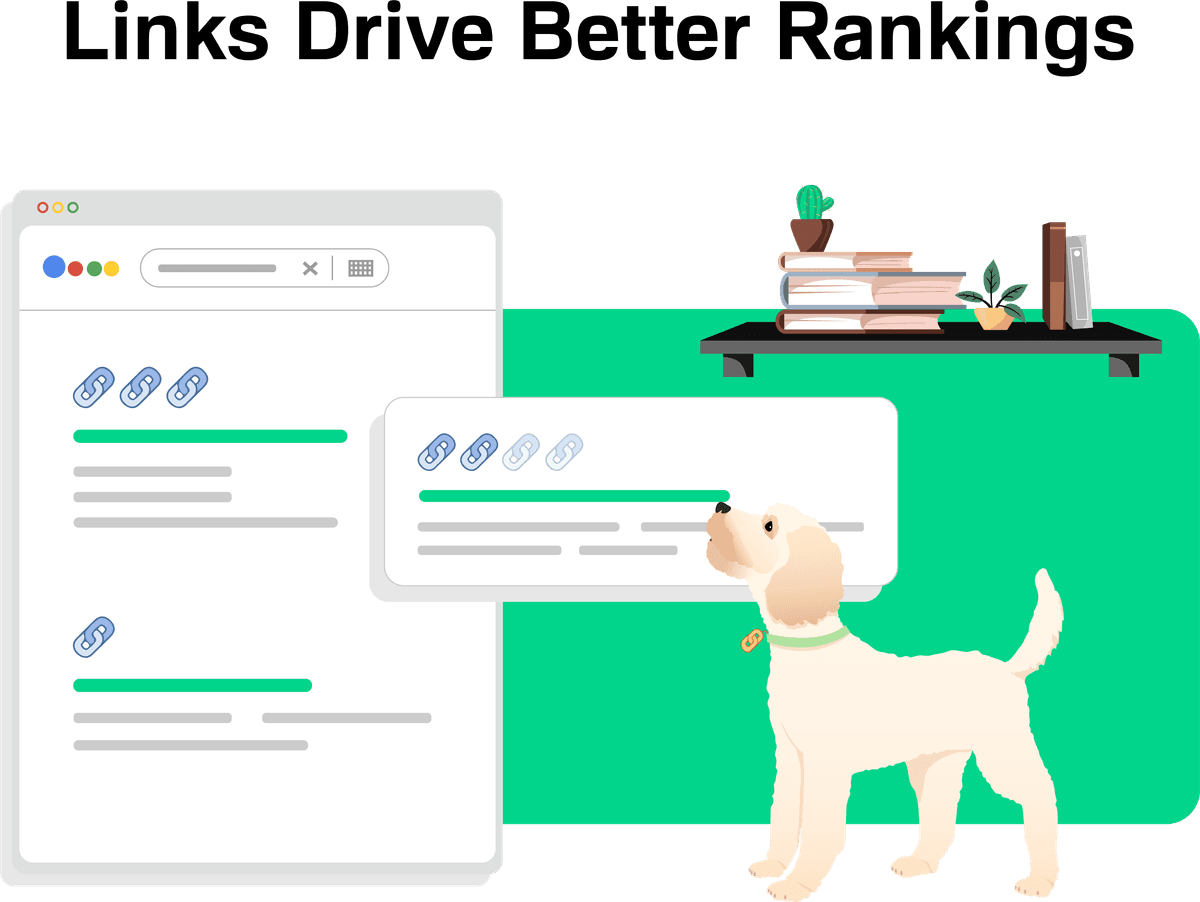
Links are a confidence signal for search engines
You may be wondering why search engines like Google place so much importance on backlinks when it comes to determining how a page ranks.
The reason is simple: website owners won’t link to bad content—unless they are in the business of building spammy backlinks. This means Google can be confident that pages with many backlinks pointing to them are worth showing at the top of the search results.
If other websites—particularly authoritative websites—link to yours through a backlink, it indicates to Google that your website is trustworthy.
Take, for example, a study by Textio that was shared on Business Wire:
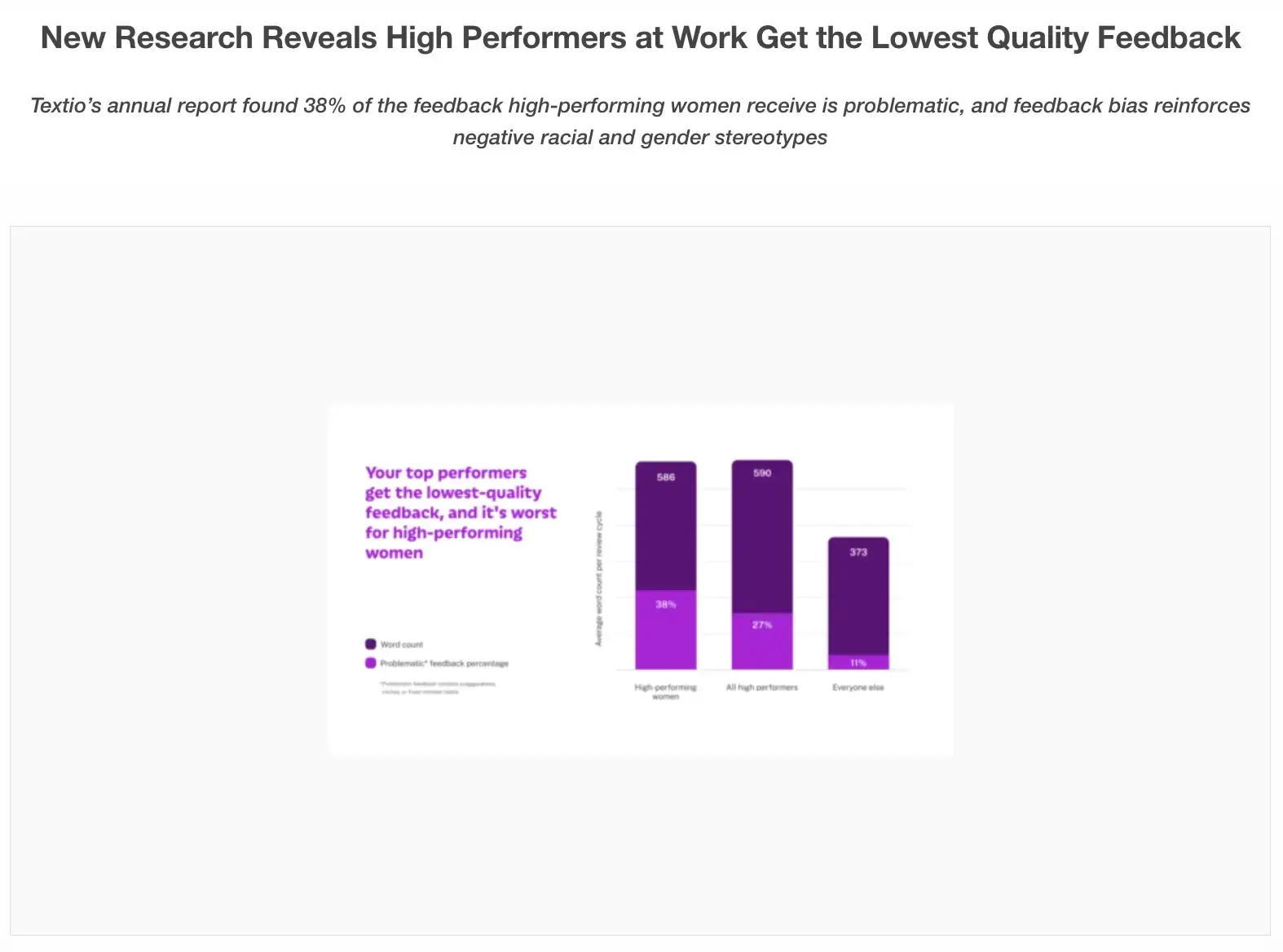
This backlink from Business Wire is incredibly valuable because the domain is so authoritative, boasting a DR of 92:

Business Wire’s decision to link to Textio’s study wasn’t random—it was based on the credibility and relevance of the research.
Business Wire, being a reputable news distribution service, will only link to sources it considers authoritative and trustworthy.
Reputable websites generally rank higher and pass on more powerful link equity. So, gaining quality backlinks from authoritative websites should be a key part of your link-building strategy.
If you want to earn backlinks from other websites, you need to create valuable, link-worthy content.
What is domain authority (DA) and domain ranking (DR)?
Domain authority is a metric developed by Moz that’s used to determine the authority of a website. DA predicts how a website will rank on search engines.
Similarly, domain ranking is a metric developed by Ahrefs that also predicts how well your website will rank in the SERPs.
Most link builders use one of these metrics because they provide a quick and reliable way to gauge the authority and quality of a website.
By evaluating these scores, link builders can prioritize their efforts and target authoritative sites that are more likely to pass SEO benefits through backlinks.
Backlinks are important for other reasons, too
Other than being an important ranking factor, backlinks also have other essential functions.
SEO backlinks go beyond simply improving your website’s ranking. They can also:
Generate traffic: A link on a high-traffic page may result in many people clicking through to your website. This is called referral traffic.
Increase brand exposure: The more links you get, the more exposure your brand will receive as people click on the links.
Better relationships: Outreach campaigns to secure external links can help you build relationships with other sites in your niche.
What Is an Outreach Campaign?
This is the process of identifying and contacting high-authority websites to suggest or request that they include your backlink in their content.
Not All Backlinks Are Equal
At this point, you may be thinking that it’s important to get as many backlinks as possible to boost your backlink profile and improve your SEO.
While this is the case to some extent, remember that not all backlinks are created equal.
Your efforts should be focused on securing high-quality backlinks and niche content rather than taking every opportunity to generate incoming links.

Low-quality links, like those from web directories, may not move the needle on your SEO efforts.
Many types of backlinks, like spammy backlinks, can even harm your business.
What are spammy links?
Also known as low-quality links, these backlinks appear on spam websites, websites with poor authority, or in comment sections on blogs:

As stated in Google Essentials, anything could be considered a “link scheme.” A link scheme is any attempt to manipulate your search rankings by building unnatural links.
As a result, you need to exercise caution when it comes to building backlinks. Choose a link-building strategy that Google likes, and you should achieve success.
Low-quality links, spammy backlinks, and black-hat SEO practices could harm your website and reputation, especially if you get a Google penalty.
What is black-hat SEO?
This is the practice of using SEO tactics that go against the guidelines of search engines to manipulate them into improving a website’s rankings. Some examples include:
👎 Keyword stuffing: This involves overloading a webpage with keywords or key phrases in an attempt to manipulate a site’s ranking in search engine results. This makes the website difficult for users to read, and Google’s algorithms are adept at spotting keyword stuffing.
👎 Cloaking: This is a technique where the content presented to search engine crawlers is different from what users see on their browsers. This can involve showing a search engine a page full of keywords to boost rankings while displaying entirely different content to human users.
👎 Engaging in private link networks: Private link networks, also known as private blog networks (PBNs), create a series of sites that link to each other with the purpose of artificially inflating each site’s authority. Search engines view this tactic as an attempt to game the system, and they actively seek out and penalize sites involved in PBNs.
What should you look for in a Backlink?
Now that you know more about the importance of backlinks for SEO and how they can help you rank higher in search engine results, let’s unpack what you should look for when working to gain backlinks.
A good backlink is:
Natural: It appears in website content organically and is not part of a ploy to manipulate search engines into boosting your rankings.
Reputable: It appears on a trustworthy and authoritative website.
Highly relevant: The link appears on a website that is relevant to your niche, brand, and audience.
There are several other factors that you would want to consider. We created a complete guide that tells you everything you need to know to find great sites (and avoid bad ones).
Links that are less valuable include:
Directory websites: Sites such as Yell don’t tend to publish their own content, often have low traffic, and they may let just about anyone create a profile.
Link farms: Websites like Is It Vivid and Technofizi are set up for the sole purpose of selling links. These sites sometimes have high domain authority, but they tend to have low traffic and poor content. They are easy to get links from if you’re happy to pay.
New websites: New websites tend to have little traffic, and they score low on domain metrics. Links from these sites aren’t as powerful as those from established sites. They may still be worth getting, as they would probably grow in value as the sites become more established.
Unfortunately, most links don’t easily fit into these categories.
For example, links that appear in a blog post, on niche websites, or local news sites (which is great for local link building), can all benefit your site, even if they don’t have as much authority as a link from the New York Times (NYT).
However, the most powerful links tend to be editorial links from high-authority publications. These links are natural, reputable, and highly relevant.
Consider top-tier websites like the NYT or the BBC, for example.
These sites tick all the right boxes. They have high domain metric scores, plenty of traffic, and they publish new, high-quality content every day.
Here’s an example of a great link we obtained from Business Insider:

This backlink was earned as a result of our original research on the effectiveness of link building in 2024.
The backlink is particularly relevant because the content directly relates to link building—an area of interest to SEO professionals and digital marketers who form part of Business Insider's audience.
Business Insider, in recognizing the value of this research, linked to us as a credible source. This was a massive win because Business Insider is a highly authoritative website with a DR of 92.
However, it can be difficult to gain these types of backlinks. Here are some strategies you can use to gain authoritative, relevant backlinks:
👍Create quality content: Focus on creating in-depth, data-driven content that addresses gaps in your industry. You can use tools like Google Trends, Ahrefs, and BuzzSumo to identify trending topics and content opportunities.
👍Engage in digital PR: Develop compelling stories or press releases related to your brand’s achievements or research, or contribute valuable insights on industry developments. Pitch these stories to journalists and editors at relevant high-authority publications.
👍Do guest blogging: Identify authoritative blogs or relevant websites that accept guest posts. Ensure your blog post is tailored to their audience, provides value, and includes external links to your site.
👍Build relationships: Strategic relationships with influencers and industry leaders can lead to backlinks, as these individuals are more likely to mention your business or link to your content. Connect with them through social media, at industry events, or perform direct outreach.
Other Relevant Factors
The authority of the website you get the link from isn't the only factor to consider. Anchor text and the type of link you gain also contribute to how well your site ranks.
Anchor text
Anchor text is highlighted text in articles that shows where links navigate to. Google’s algorithm uses anchor text to decipher what the page is about.

The anchor text “Is link building still effective,” lets Google determine the nature of the linked content, i.e., whether link building is still a good SEO strategy.
You can’t control anchor text when people link to your site organically. But if you write a guest post or use niche edits, you will have some control over your anchor text.
Some best practices when it comes to anchor text include:
Not over-optimizing your link text with keywords—they should appear natural.
Being clear and descriptive.
Making the link relevant to the surrounding text.
Varying the keywords in your anchor text.
Use this guide to learn everything you need to know about creating powerful and effective anchor text.
Follow vs. nofollow links
Another important factor is whether the link is dofollow or nofollow.
Nofollow links are those that the website owner has told Google’s algorithm not to crawl. This makes them less valuable than dofollow links because they do not pass link equity to your site.
Ahrefs’ Site Explorer tool offers a backlink analysis feature that allows you to check whether a backlink is nofollow.
First, enter the URL or domain you want to analyze in the tool:
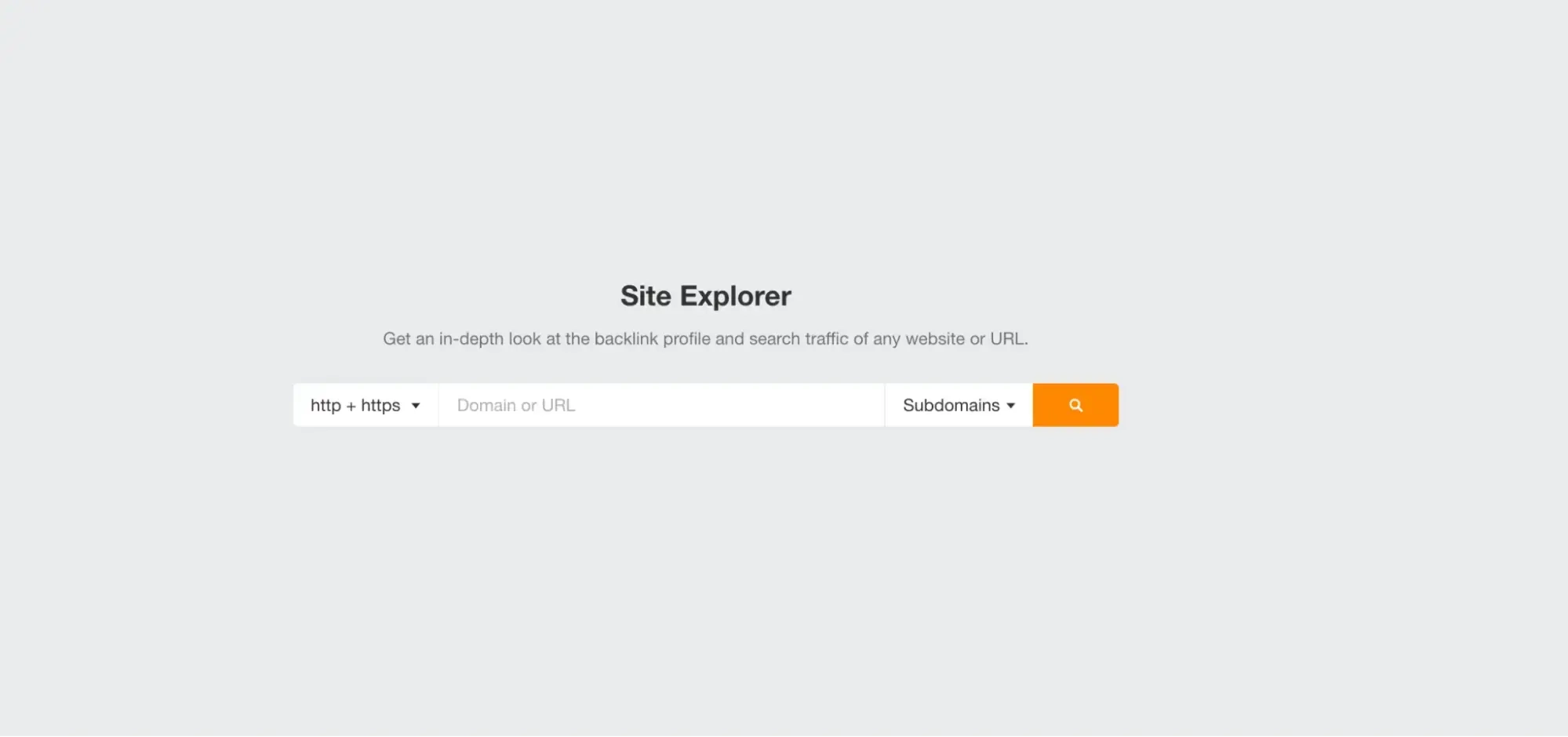
Navigate to the ‘Backlinks’ section on the left panel:
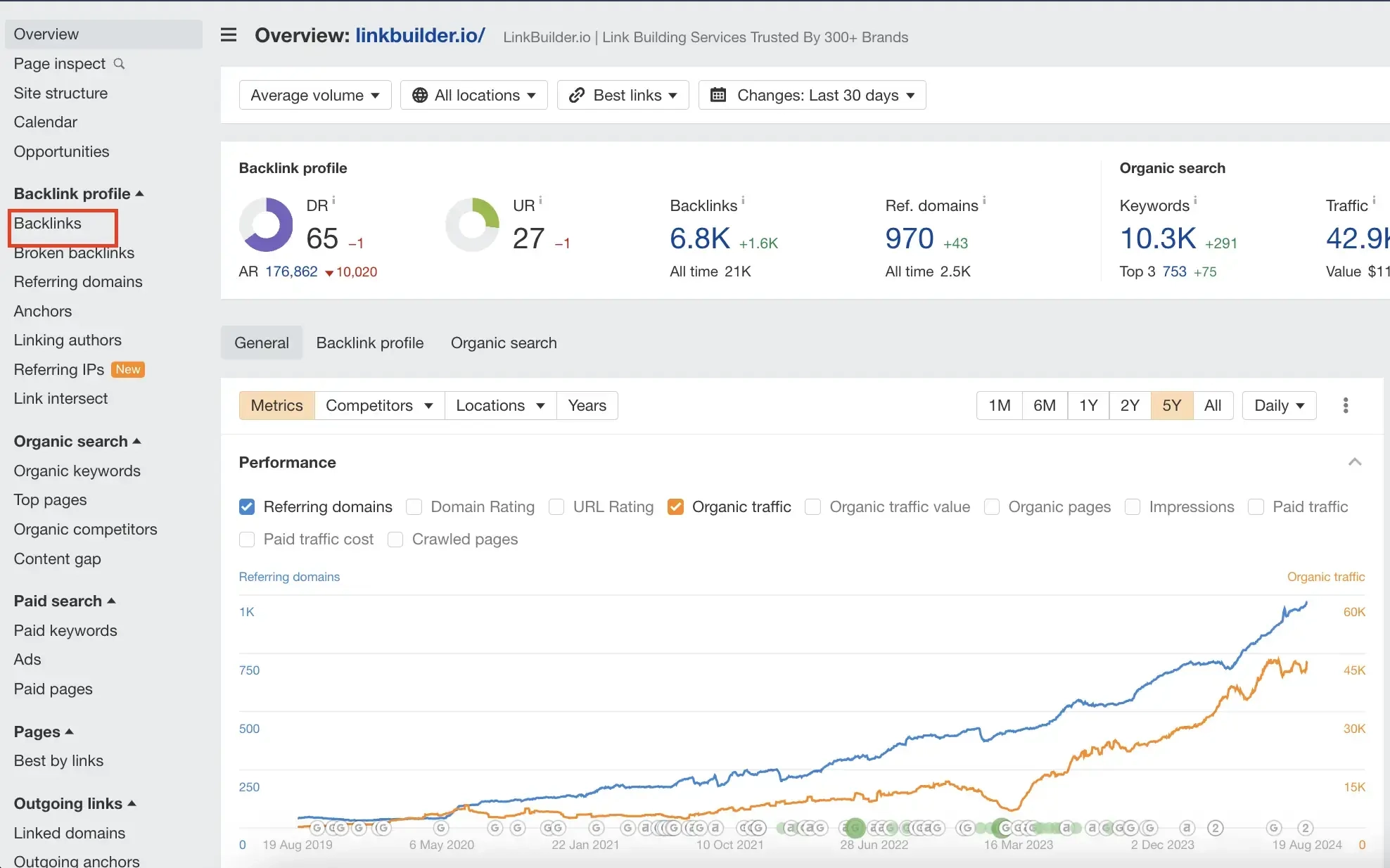
Navigate to the dropdown menu and select ‘Nofollow’. The results will display all the nofollow links your website has received:
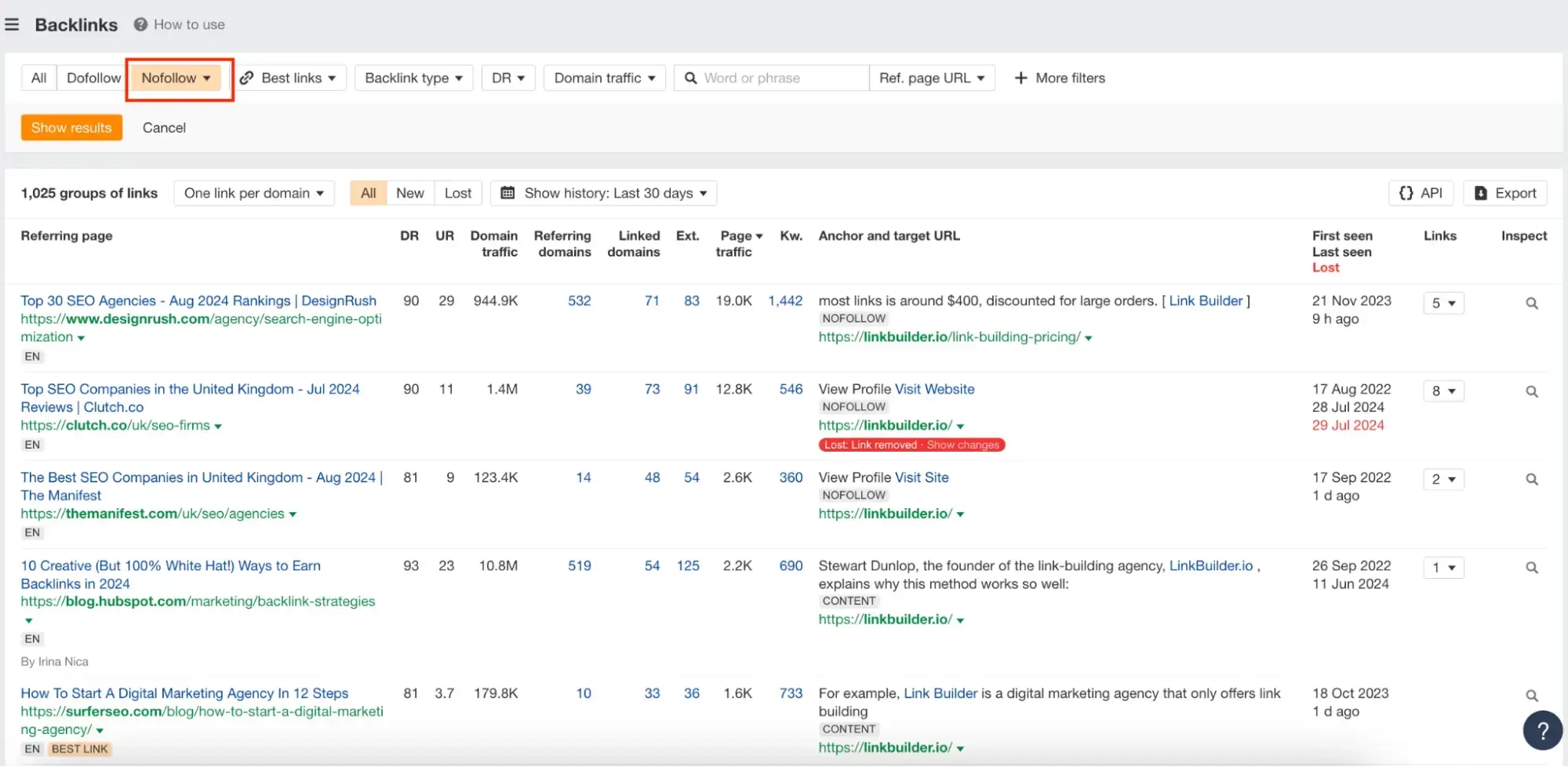
Can You Rank in Google Without Backlinks?
You can rank on Google without building backlinks. But you’ll typically struggle to rank for anything other than low competition terms.
And these terms are low competition for a reason.
They tend to have:
Low search volume: Which means they don’t generate much traffic.
Low value: This means that even if they bring in traffic, the visitors are hard to monetize.
If you plan to target low-competition terms, you won’t necessarily need backlinks.
But if you want to rank for more competitive terms, you'll battle to do so without some form of backlinking in your SEO strategy.
Improved SEO is not guaranteed
Google’s ranking algorithm undoubtedly assesses a website’s backlink profile. While it is an important ranking factor, it isn’t the only ranking factor.
No one knows every factor that the Google algorithm considers. Depending on who you ask, there could be over 200 aspects that Google looks for.
However, most people agree that all the following aspects will affect your ranking:
Links
Content
Search intent
On-page experience
To rank, you need to ensure that your website ticks all (or most of) these boxes, not just the one for backlinks.
Think about these questions:
Does your page match search intent?
Search intent is arguably one of the most important ranking factors.
Google wants to provide the most relevant pages for any given search term.
If your page doesn't include the information the searcher is looking for, it is very unlikely that your page would rank—no matter how many backlinks it has.
When creating content, you must consider whether your page contains information someone searching for your target term or keyword will find useful.
For example, by including guides, how-tos, and advice on your website pertaining to your target keyword, it’s more likely that Google would show your website in search results.
Here you can see that guides and explainers are the top-ranking pages for our search:
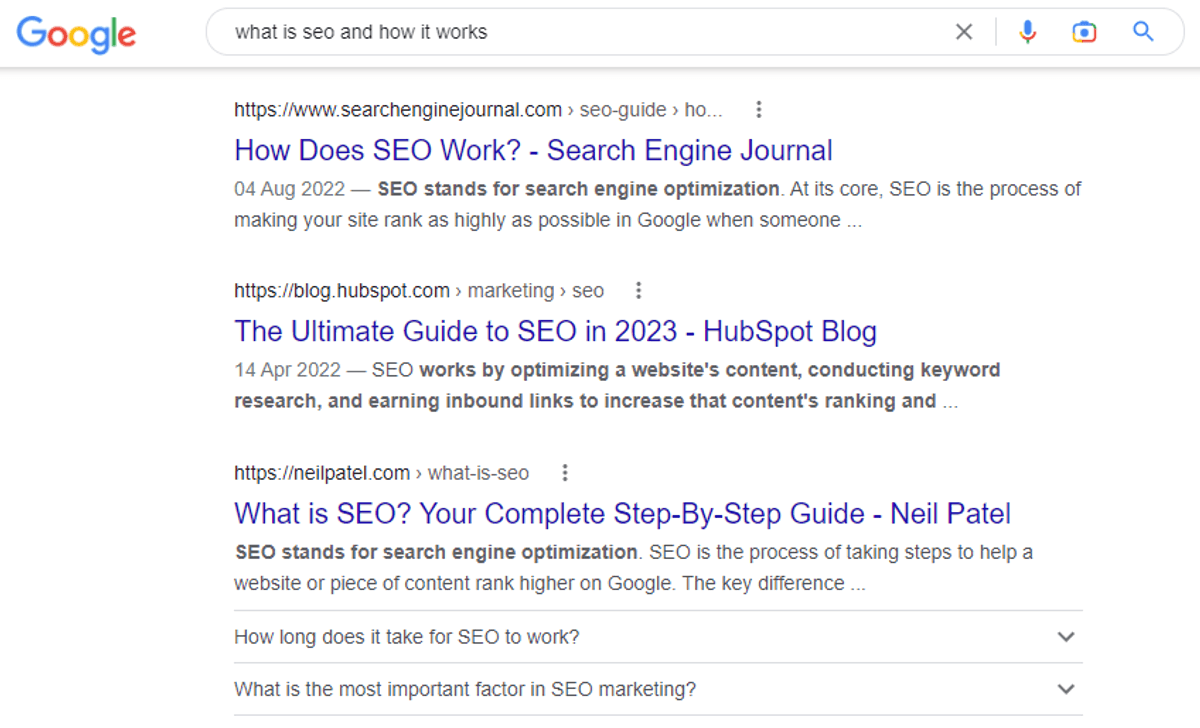
The good news is that discovering search intent is quite straightforward. Simply search for your term on Google to see the results that the search engine already shows for the query.
Use these pages as the basis for developing your own content.
Is your web page optimized?
You should also optimize your content for the search term you’re targeting. Let’s take the following blog about fitness advice as an example:

Key optimization factors include:
👉 Using the correct keywords: The title is optimized with the target keyword "fitness advice 2024." This keyword aligns with what users are searching for when looking for up-to-date fitness tips.
👉 Ensuring your content is the right length: This article strikes a balance between being comprehensive and concise. It provides eight pieces of advice, so it’s lengthy enough to cover the topic but not overwhelmingly so.
👉 Using the correct headings: In this example, each piece of advice is introduced with its own heading, which makes it easy for both users and search engines to digest.
👉 Publishing high-quality content: High-quality content engages readers and encourages them to spend more time on the page. This reduces bounce rates, which is another positive signal to search engines.
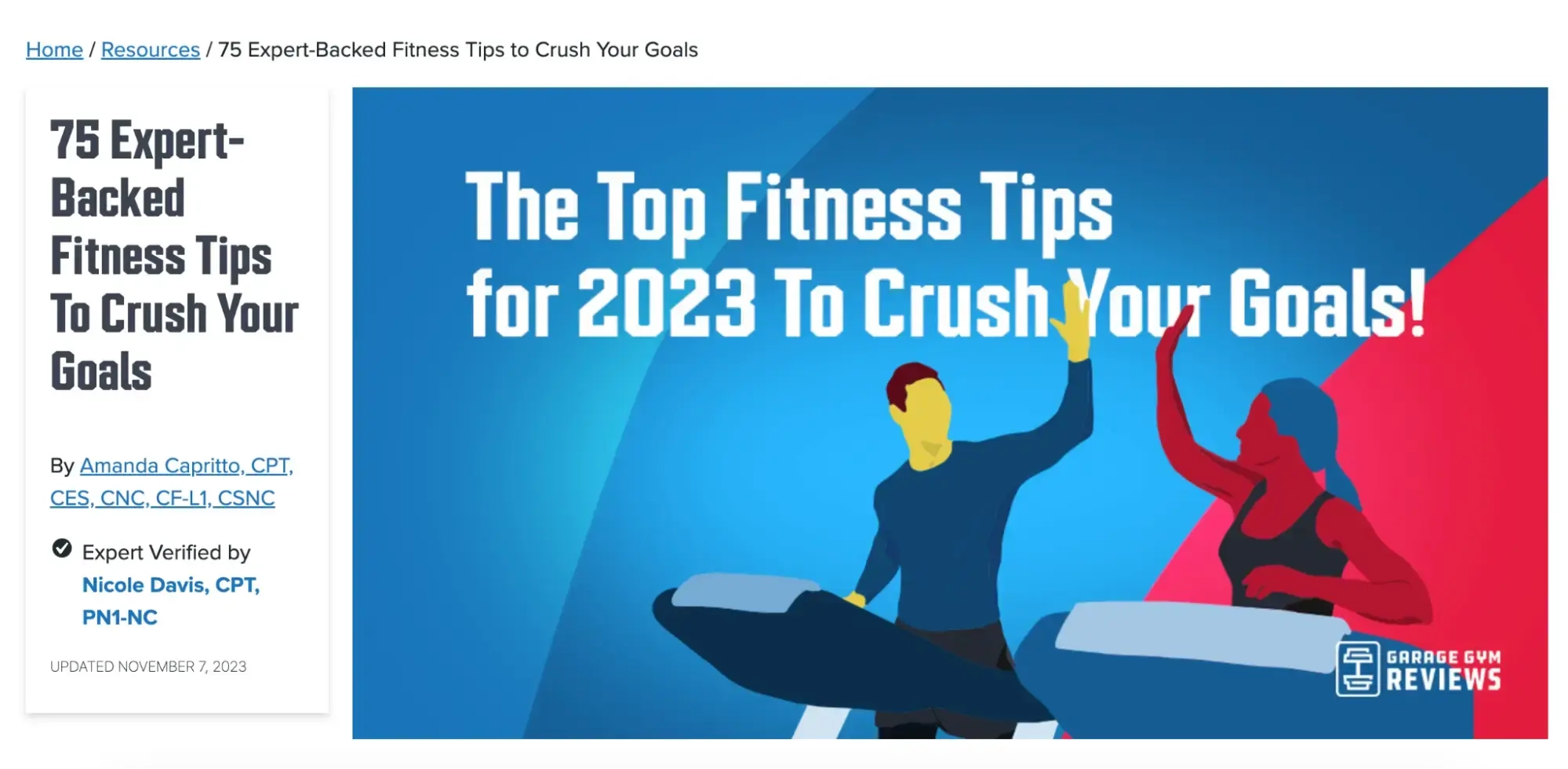
SEO tools like SurferSEO and Clearscope can help you optimize your content by making suggestions based on content that already ranks well.
Is the on-page experience good?
Google likes to promote sites that offer a good user experience. User experience includes factors like the time it takes for your website to load and respond, as well as how easy it is to navigate.
Google recently began using Core Web Vitals to measure the user experience a website offers.
Here’s a tweet from Google Search Advocate, John Mueller, that confirms this:
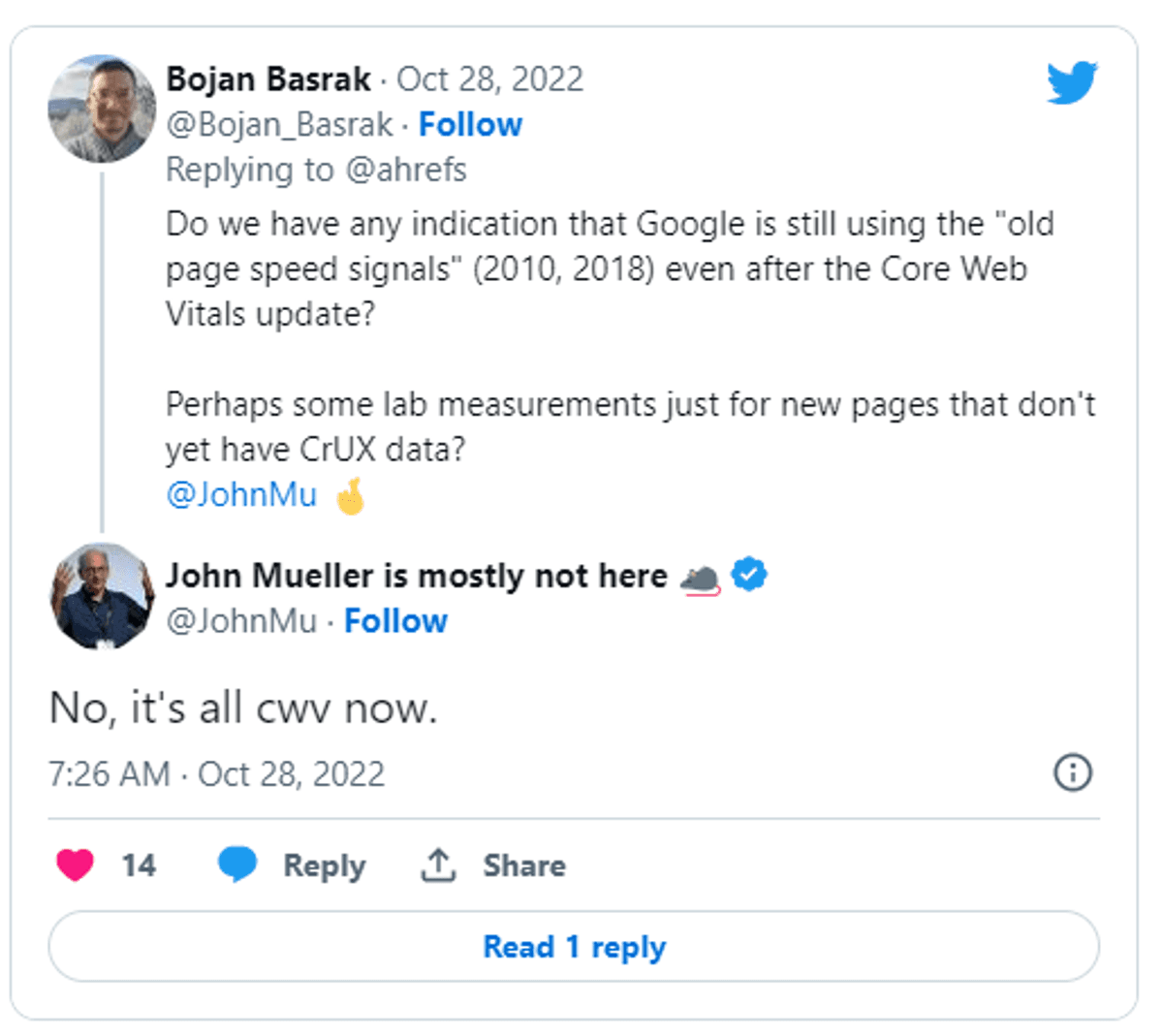
You can use Google Search Console to measure your website’s performance and diagnose issues.
Core Web Vitals applies a set of four tests that measures how quickly and consistently a page loads. These metrics are crucial for understanding the user experience and optimizing your site for better rankings.
The four key metrics tracked are:
First Contentful Paint (FCP): How quickly the first content loads on screen.
Largest Contentful Paint (LCP): How quickly the main content on your site loads.
First Input Delay (FID): How long it takes from the user first interacting with your site to the browser responding.
Cumulative Layout Shift (CLS): How much content on your page moves once it has loaded. For example, if you're reading an article and an image loads above the text and causes the text to move.
Google measures each of the above points and then gives your website a score out of 100. Anything over 90 is a great score. Here’s what your report might look like:
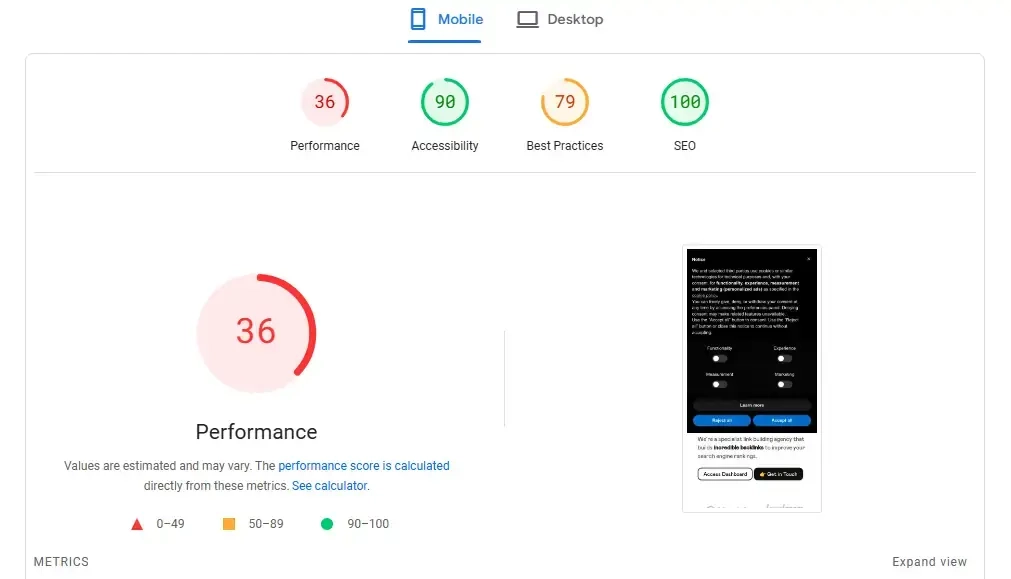
Wrapping Up on the Importance of Backlinks for SEO
You now know that backlinks are one factor that is crucial to SEO success. And more importantly, you know what types of backlinks you should aim to place.
The next challenge you’ll face is how to go about building effective backlinks. This is where we can help.
Visit our website to learn more about our link-building services and how we can help you gain the high-quality backlinks you need to rank well on search engines.

